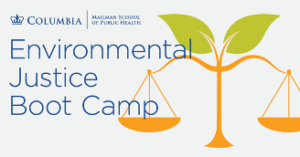 More than 70 trainees, professors, community advocates, and folks with a variety of backgrounds came together on August 15th and 16th for an in-depth online boot camp on the theories and methods to study environmental health disparities and environmental justice (EJ). This boot camp was co-led by Dr. Tamarra James-Todd, an Associate Professor in the Departments of Environmental Health and Epidemiology at Harvard TH Chan School of Public Health and Dr. Joan Casey, an Assistant Professor in the Department of Environmental Health Sciences at Columbia’s Mailman School of Public Health.
More than 70 trainees, professors, community advocates, and folks with a variety of backgrounds came together on August 15th and 16th for an in-depth online boot camp on the theories and methods to study environmental health disparities and environmental justice (EJ). This boot camp was co-led by Dr. Tamarra James-Todd, an Associate Professor in the Departments of Environmental Health and Epidemiology at Harvard TH Chan School of Public Health and Dr. Joan Casey, an Assistant Professor in the Department of Environmental Health Sciences at Columbia’s Mailman School of Public Health.
The creation of this yearly EJ boot camp was driven by a lack of training opportunities surrounding designing studies and implementing methods/statistical analyses for evaluating environmental health disparities and environmental injustices. The popularity of the two-day crash course in EJ in 2021, led to its continuation this past August.
Experts from across the country lectured on a variety of topics including social constructs and the history of EJ, methods and statistical analyses, and the role of implementation and translational science. These speakers included Dr. Lindsey Martin at the National Institute of Environmental Health Sciences (NIEHS), Dr. Tracey Woodruff at the University of California (UC) San Francisco, Dr. Alex Keil at the National Cancer Institute, Dr. Mahasin Mujahid at UC Berkeley, and Dr. Gary Adamkiewicz from our very own Harvard Chan. There were also two “Meet and Greet” sessions, where attendees could ask their questions and learn more from experts in this field (including but not limited to John Faust at California Environmental Protection Agency, Rachel Morello-Frosch at UC Berkely, and Diana Hernández at Columbia). The boot camp also featured two case studies, led by Dr. James-Todd and Dr. Casey, which walked through analytic methods to evaluate EJ questions.
Beyond the training, the boot camp was a place for like-minded individuals passionate about EJ work to meet each other, share experiences and perspectives, and learn together. The community developed here will be an ongoing network for folks as they continue in this work.